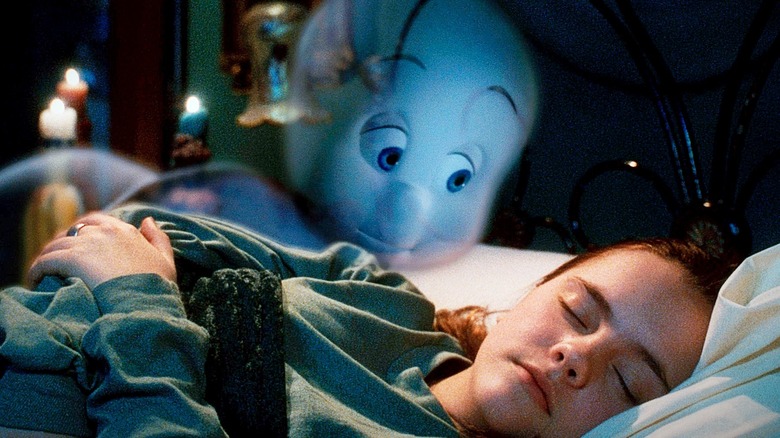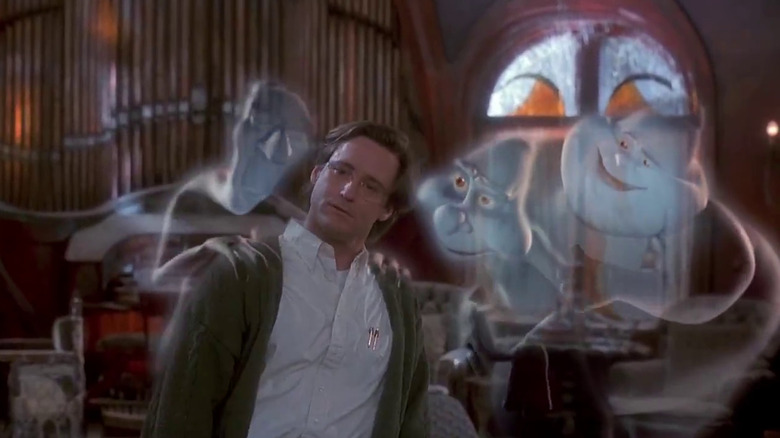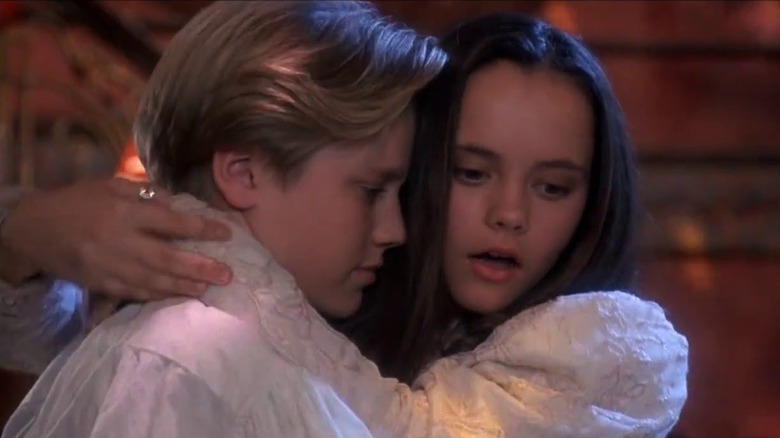The 1995 Movie Casper Is Deeply Upsetting, And We Need To Talk About This
When "Casper" was released in 1995, I doubt anyone thought it would carry the cult legacy it enjoys today. The film was only a moderate success at the box office, and its PG rating completely derailed audience expectations. The first live-action adaptation of "Casper the Friendly Ghost," was marketed as a heartfelt and entertaining way to educate children about death and what comes after, as well as learning how to appreciate those we have while they're still on this Earth. "Casper" is often cited as nothing more than a children's film with an animated ghost trying to find a friend for the afterlife, but few remember how depressing the film actually is, and its deeply examined themes of loss, grief, neglect, and the human's unwillingness to accept the reality of mortality.
Bill Pullman plays paranormal therapist James Harvey who has recently moved into a haunted manor in Maine with his daughter Kat (Christina Ricci) while simultaneously trying to contact the spirit of his deceased wife. Harvey's profession forces him to travel around the country, to the point where Kat's well-being and social life is the sacrificial lamb thrown on a pyre in order for Harvey to pursue his obsessive desire to see his wife again. Kat struggles to make friends due to her constant moving, so it's no wonder that the first real friend she makes is one of the ghosts that haunts her new home. Sure, the duo get into plenty of ghostly hijinks and Cathy Moriarty and Eric Idle have great roles as the villainous duo looking to find the alleged treasure hidden in the walls of Whipstaff Manor, but hidden beneath the playful scenes of "Casper" lies a deeply upsetting plot point that few people ever think about.
In Case You Forgot, A Lot of People Die
After moving into the haunted house, Dr. Harvey attempts to have therapy sessions with the three "mean" spirits, Casper's uncles Stinkie, Stretch, and Fatso. In a cruel prank (because this trio is THE WORST) they promise to repay Harvey by convincing him they are in touch with his dead wife. They're lying, obviously, and Dr. Harvey becomes despondent after he realizes they've failed him. While in his vulnerable state, they take him to a bar with the intention of killing him and becoming a quartet. The trio have a change of heart after a drunken Dr. Harvey promises to help them keep Cathy Moriarty's Carrigan off their back, but in a moment of cruel irony, Dr. Harvey accidentally falls down a manhole and dies, leaving Kat an orphan in a haunted house.
When Kat sees her father as a ghostly apparition for the first time, she is rightfully devastated. She's now lost both of her parents, her only real friend is a ghost, and she is now literally as alone on this mortal plane as she's ever felt. Casper, being the friendliest ghost you know, sacrifices his only opportunity to become a human again and instead allows Dr. Harvey the chance to return to mortal existence through the use of the Lazarus machine, an invention created by Casper's dad (who was institutionalized for claiming his dead son was haunting him) that contains the ability to bring the dead back to life. The ghost of Dr. Harvey goes through the machine, transforms back to a human state, and the Harvey family has a dance party with their new ghastly brethren ... but there's one massive problem with this so-called "happy ending."
The Lazarus Machine Transforms Ghosts, Not Resurrects Flesh
Just to make sure we're all on the same page here, the Lazarus machine reanimated the ghost of Dr. Harvey, but his fleshy corpse is still at the bottom of a f***ing manhole. So while the movie ends with Dr. Harvey dancing around and having a good ol' time with his daughter and their ghostly pals, his actual born-of-this-Earth body is rotting away in some sewer in front of a bar and some unsuspecting construction worker is going to have one hell of a Monday when they find it. Better yet, when the cops show up at Whipstaff to inform Kat that they've found the dead body of her father, they're going to all have to be institutionalized when a very much alive Dr. Harvey answers the door.
Casper's dad was so incapable of accepting the loss of his son that he created a machine that could transform a ghost into a human being, which sounds great until you remember that his lil' baby Devon Sawa child, the one that he changed as baby and taught how to ride a bike, is sleeping in a mound of dirt six feet under. Had his plan worked, he could have theoretically visited his own grave, something that is far too warped to imagine for a PG movie.
Anyway, enjoy the existential nightmare this movie will inspire the next time you hear, "Can I keep you?" during the school dance scene. I was cursed with this information over a decade ago by indie filmmaker Dustin Mills, and I am now passing it on like the tape from "The Ring," in the hopes that maybe I one day won't be haunted by this knowledge.


